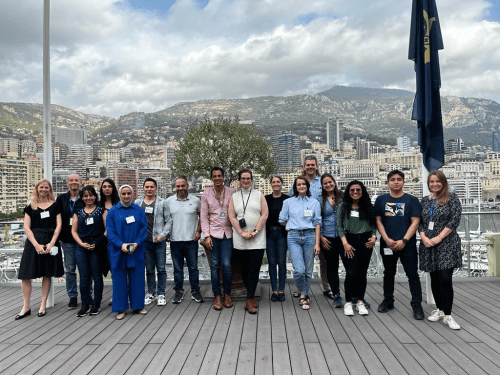Dates: 13-24 November 2023
Location: San José, Costa Rica
Deadline for receipt of applications from the nominating national authority: 28 September 2028
Introduction
The Workshop on Communicating on Ocean Acidification will provide participants with the foundations to communicate the science and impacts of ocean acidification to diverse audiences, including the general public, fellow scientists, policy makers, stakeholders, and students. The workshop is held as part of the activities under the IAEA Peaceful Uses Initiative project “Ocean Acidification International Coordination Centre” (OA-ICC) in cooperation with external partners.
Objectives
Ocean acidification is a critical environmental issue that threatens marine life, ecosystems, and the livelihoods of coastal communities. Given the timely nature of this environmental challenge, it is crucial that all stakeholders including policy makers, industry leaders, and the public, understand the issue as well as the strategies for adaptation and mitigation. However, communicating the science and impacts of this critical environmental issue remains a challenge given the complexities of ocean carbonate chemistry and the varied biological impacts of ocean acidification. Beyond increased understanding and awareness of ocean acidification and its impacts on marine ecosystems and associated services, effective communication should aim at driving actions toward mitigation and adaptation. This requires novel and goal-oriented communication strategies.
The aim of this workshop is to share science communication theories and strategies with scientists working in the ocean acidification field (chemistry, biology, or modelling) who wish to improve their communication skills. Participants will have the opportunity to engage with citizens, journalists and policy makers to better understand how science communication can be utilized with specialized audiences. By the end of the course, participants will have a better understanding of communication techniques and tools to comprehensively convey their ocean acidification research. The course will also provide opportunities for participants to network with peers and engage with the broader ocean acidification community.
Target Audience
The Workshop is open to 10 trainees funded by the IAEA and up to 10 participants funded by Member States. Priority will be given to early-career scientists with documented experience on ocean acidification and demonstrated capacity to disseminate the gained knowledge and/or implement a local communication strategy. Scientific publications in the relevant fields will be valued.
Working Language(s)
English
…
Participation and Registration
All persons wishing to participate in the event must be designated by an IAEA Member State or should be members of organizations that have been invited to attend.
In order to be designated by an IAEA Member State, participants are requested to send the Participation Form (Form A) to their competent national authority (e.g. Ministry of Foreign Affairs, Permanent Mission to the IAEA or National Atomic Energy Authority) for onward transmission to the IAEA by 28 September 2023. Participants who are members of an organization invited to attend are requested to send the Participation Form (Form A) through their organization to the IAEA by the above deadline.
Selected participants will be informed in due course on the procedures to be followed with regards to administrative and financial matters.
Participants are hereby informed that the personal data they submit will be processed in line with the Agency’s Personal Data and Privacy Policy and is collected solely for the purpose(s) of reviewing and assessing the application and to complete logistical arrangements where required. The IAEA may also use the contact details of Applicants to inform them of the IAEA’s scientific and technical publications, or the latest employment opportunities and current open vacancies at the IAEA. These secondary purposes are consistent with the IAEA’s mandate.
Expenditures and Grants
No registration fee is charged to participants.
The IAEA is generally not in a position to bear the travel and other costs of participants in the event. The IAEA has, however, limited funds at its disposal to help meet the cost of attendance of certain participants. Upon specific request, such assistance may be offered to normally one participant per
country, provided that, in the IAEA’s view, the participant will make an important contribution to the event.
The application for financial support should be made using the Grant Application Form (Form C), which has to be stamped, signed and submitted by the competent national authority to the IAEA together with the Participation Form (Form A) by 28 September 2023.
…
Additional Information
Only those participants who have been designated by the relevant authorities of an IAEA Member State and have been selected by the IAEA will be informed by 6 October 2023.
The course is funded through the IAEA.
Participants should also make their own arrangements for transportation, passports and vaccinations (including COVID, if required). The closest airport is Juan Santamaria International Airport (SJO) in San José, Costa Rica.
Additional Requirements
The participants should have a university degree in marine chemistry, biology, oceanography or a related scientific field, and should be currently involved in ocean acidification research.
Selection will be based on merit and interest. Your applications should include:
- A motivation letter with a short description of your research interest, why you would like to participate, and your plans regarding present and future ocean acidification research (max one A4 page).
- CV with publication list.
IAEA / OA-ICC Contacts
Subsequent correspondence on scientific matters should be sent to the Scientific Secretary and correspondence on other matters related to the event to the Administrative Secretary.
Scientific Secretary: Ms Sarah Flickinger
Email: S.Flickinger@iaea.org
Administrative Secretary: Ms Carolina Galdino
Email: C.Galdino@iaea.org
…
IAEA / OA-ICC, 31 August 2023. More information.
Like this:
Like Loading...










